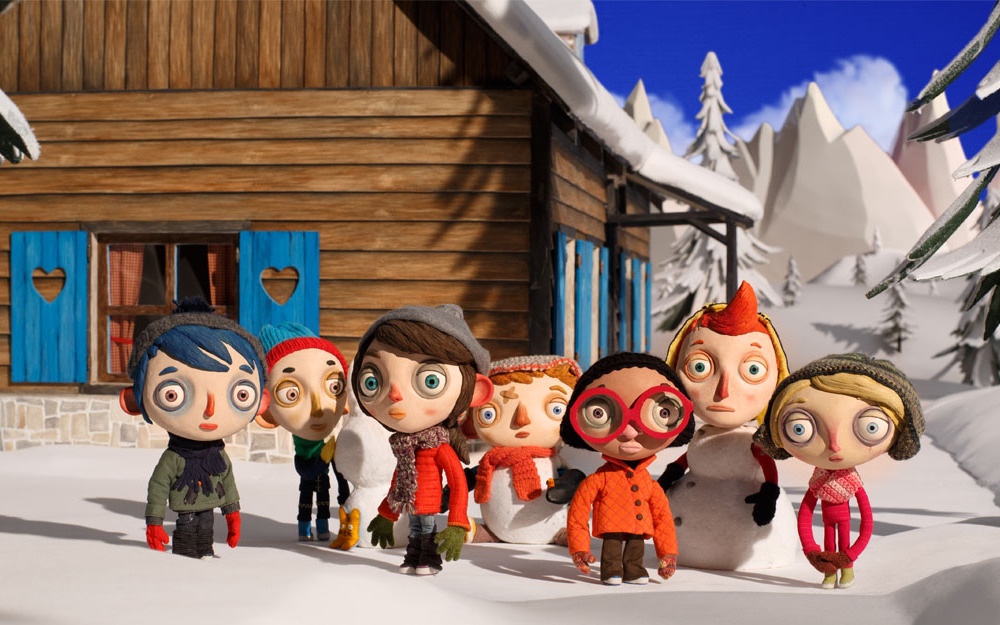My Life as a Courgette
Mar 22, 2018 - 19:30 - Corn Exchange
- Director: Claude Barras
- Year: 2016
- Country: Switzerland/France
- Run Time: 66 mins
- Ratings
- A: 34
- B: 40
- C: 7
- D: 3
- E: 0
- Overall: 81

Consider yourself forewarned. This Oscar-nominated stop-motion animation, which arrives in British cinemas three months after its valiant clash with Zootropolis, Moana et al at February’s Academy Awards, should be approached with extreme caution by the quivery of lip and delicate of tear duct. That much should be clear from the opening shots of Swiss filmmaker Claude Barras’s slim but nimble 66-minute debut feature, in which a child’s crayons lie on a wooden attic floor among crumpled beer cans. It’s an electrifyingly concise image, rendered in hand-crafted scale models, that captures both a young imagination’s means of escape, and the monster it might be escaping from. The imagination in question belongs to nine-year-old Icare, and the empty cans to his mother, who calls her boy Courgette for reasons that aren’t made clear, but don’t seem to be wholly affectionate. After a tragic incident that nonetheless feels bleakly for the best, Courgette (voiced by Erick Abbate in the French-language version, on which this review is based, and Gaspar Schlatter in the English dub) is taken to a rural orphanage, where he lives under the protection of caring headmistress Madame Papineau (Monica Budde/Susanne Blakeslee). Courgette’s half-dozen or so dorm-mates each has their own sad story to tell. It’s to the credit of both Barras and his collaborator Céline Sciamma – the French director adapted the screenplay from a 2003 young-adult novel – that none of the children feels like a standard classroom type. Even Simon (Paulin Jacquod/Romy Beckman), who seems at first to be the alpha bully of the roost, is far more complex and loveable than that tag allows. This isn’t just good writing, it’s humane and honourable. Every child here feels like a real human being, and as such is accorded a dignity the world invariably hasn’t extended to them in their lives to date. Anyone familiar with Sciamma’s own tremendous coming-of-age and discovering-of-identity films, such as Girlhood (2014) and Tomboy (2011), will immediately recognise her sure touch. The setup – particularly in tandem with the accents, if you watch the French version – can’t help but recall François Truffaut’s The 400 Blows. Except here the children’s home itself is where freedom resides, while the wide world outside is the source of threat. Courgette and his fellow orphans have come to think of love as something conditional, perhaps even unavailable, and the film’s beauty lies in watching that understanding slowly shift, through lessons, games, class outings and conversations with this new set of adults helping to guide their lives. (In addition to Mme Papineau there are two teachers and a police liaison officer – kindly roles in which the English-language version stashes Ellen Page, Will Forte and Nick Offerman, i.e. its brand-name talent.) Think of My Life as a Courgette as less of a children’s film than a film about childhood which children can watch, and you’ll have some idea of the quietly extraordinary tone it manages to strike. Heartbreaking as it frequently is – though it’s funny just as often – the toughest details are always delicately expressed, while the scuffs and scars on the gorgeous character models’ peach-like faces are so subtle you could miss them at first glance. Stop-motion proves to be the ideal medium: part of the reason your heart aches to wrap these kids in cotton wool is that you know if you were on set, you actually could. Their round, glassy eyes pick up the light with a piercing constancy no drawing or digital character could ever recreate, while the modelling-clay texture of their hair and skin gets to a fundamental truth about their sad but still hopeful plight. Like real children, they’re remouldable. Robbie Collin telegraph.co.uk